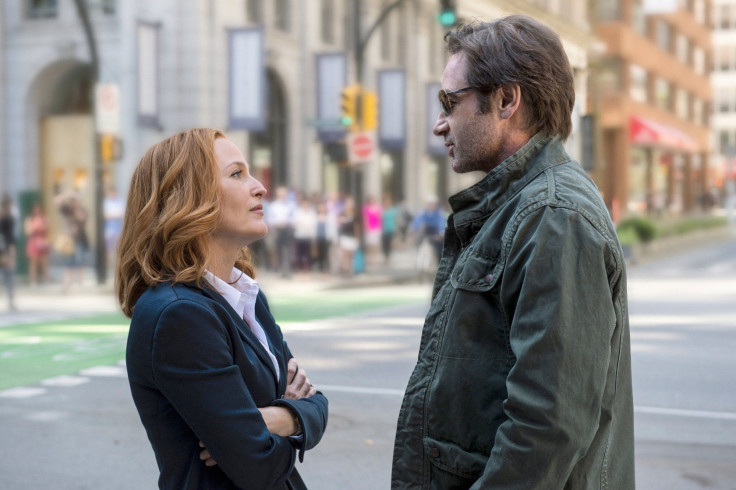My heart sank upon discovering that the fourth episode in The X-Files miniseries, “Home Again,” has nothing to do with the fourth season X-Files episode “Home,” in which a family of Texas Chainsaw castoffs impregnate their delimbed mother over and over. But then a corrupt cop gets his arms ripped off by a hulking giant, demonstrating that this new X-Files doesn’t need the Peacock Family to get dark and bloody.
Unfortunately, while “Home Again” doesn’t take after “Home,” it is a retread of one of The X-Files less successful plotlines: the people’s avenging monster.
X-Files episode “ Kaddish ” had its golem, “ Arcadia ” its Tibetan Tulpa (which “Home Again” discusses in some detail), “ Grotesque ” its murderous gargoyle and “ Fresh Bones ” its vengeful voodoo priest. There are certainly even more examples peppered through The X-Files’ original 9 season run.
It’s easy to see why the narrative is so tempting. Not only do you get a monster of the week, but its violence is attached to a human agent: someone who can be punched, interrogated, held to account, or simply asked to explain.
But “Home Again” shows the many pitfalls.
A giant is murdering people in Philadelphia, targeting exclusively progressive political villains, including a corrupt cop, greedy land developer and self-righteous NIMBY. The monster itself is a living projection of a graffiti artist’s rage, springing to life from graffiti to avenge the poor and the homeless, then disappearing into the back of garbage trucks.
Here then is the most fascinating, if not the most successful, element in “Home Again.” Together, monster and victims, comprise a surprisingly comprehensive set of progressive tropes.
It’s not that “Home Again” feels politically radical (though it’s nice to see some counterbalance to the full endorsement of right-wing, Behold a Pale Horse conspiracy theorizing that anchors the first new X-Files episode. “My Struggle”), just… trope-y. Instead, “Home Again” feels like the hardening of a specific set of new TV clichés that have been brewing since Occupy Wall Street in 2011.
Are we seeing here the birth of leftist tropes invading TV? No, probably not. From Dark Knight Rises to Law and Order: SVU , it’s not as if populist uprise, anti-gentrification and leftist protest has been absent from recent media. But “Home Again” feels like a moment where that variety of progressive storytelling has gone from the specific to the generic. The rules are encoded and the template presented.
As a viewing experience “Home Again” and its pseudo-Bansky ( played by Rancid frontman Tim Armstrong ) will induce a few eye rolls. When secondary art dealers get lines like “who knew you could make this much money off the poor,” it’s hard not to feel a little talked at. But a little on-the-nose politicking isn’t rare from this kind of show, and “Home Again” doesn’t feel half so silly as other mainstream TV nods to the comparatively edgy Banksy, such as Holmes calling on the graffiti artist for help on Sherlock .
Beyond the agitprop, “Home Again” feels like the kind of forgettable episode that pads out the middle of a 24-episode season. It’s certainly not boring. There’s plenty of monster action and one scene that knows exactly the kind of flashlight-lit, dank hallway action we’re watching for.
But while the main thread of “Home Again” is a semi-satisfying retread painted over with new progressive populist colors, the other half of the new X-Files episode fares far worse.
Scully’s mom is in a coma and asks not to be resuscitated or kept on life support. The hospital scenes mirror Scully’s own coma in second season episode “One Breath,” though most of the fun in the older episode is Scully’s coma dreams.
Anderson makes Scully’s agony evident and pointed, but is soon subsumed by a strange connection to her and Mulder’s son William, who they put up for adoption shortly after birth (in order to keep him out of the hands of the evil conspiracy). The connection between Scully’s death and her guilt at abandoning William is tenuous and ultimately intertwines with the graffiti murders in a way that feels emotionally contrived.
Unlike “Founder’s Mutation,” which dealt with Mulder, Scully and their lost child with emotional specificity, “Home Again” feels formless at best. At worst it feels cheap, as Scully’s emotional journey is aided and mirrored by a Banksy knockoff and his silly monster.
Between “Founder’s Mutation” and “Home Again,” the Mulder and Scully’s kid stuff is getting a bit thick. Mulder and Scully deserve the sentiment, but maybe a six episode miniseries wasn't the best time to plumb a subplot that already felt like a shrug 20 years.
The X-Files returns next week with penultimate miniseries episode “Babylon.”


















